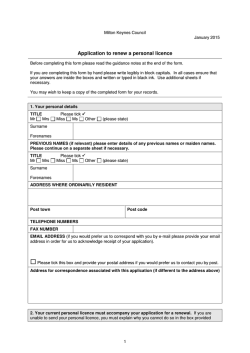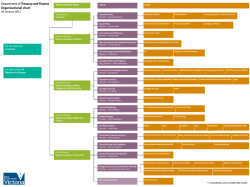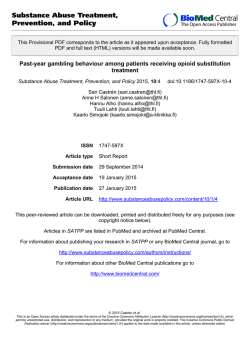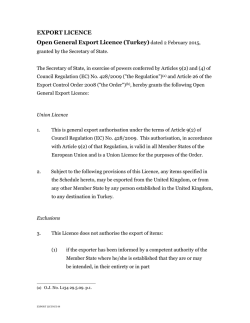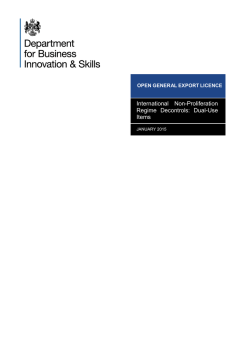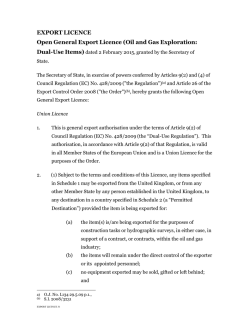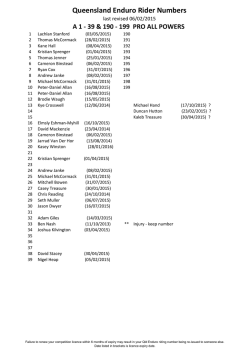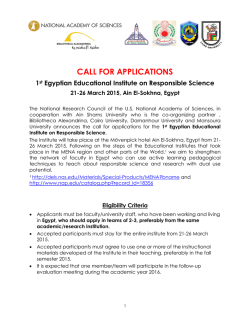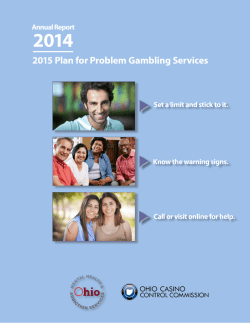
Implementing the Gambling (Licensing and Advertising) Act
Latest version available here (July 2014) Implementing the Gambling (Licensing and Advertising) Act Frequently asked questions 25 June 2014 Introduction i This set of frequently asked questions (FAQs) is the latest in a series of publications that provide updates on the Gambling Commission’s implementation of the Gambling (Licensing and Advertising) Act. ii Copies of earlier editions are available in archive1 on our website. A number of new questions have been added in this updated version and extra details have also been included in some existing sections. The key additions since early June are highlighted by the addition of shaded text. 1 What is the Gambling (Licensing and Advertising) Act? 1.1 The Gambling (Licensing and Advertising) Act requires gambling operators that provide facilities for remote gambling or advertise to consumers in Britain to obtain a licence. 1.2 The requirement to hold a licence if remote gambling equipment in GB is retained. 1.3 Those that advertise remote gambling to consumers in Britain through a British-facing business will require a remote operating licence from the Gambling Commission. 2 When is the Act going to take effect? 2.1 The Bill received Royal Assent on 14 May 2014 and has now become an Act. 2.2 The Statutory Instrument (2014 No.) The Gambling (Licensing and Advertising) Act 2014 (Transitional Provisions) Order 2014 (the SI) has been laid before Parliament and is subject to negative resolution. It is now expected that the Act will come into force on 1 October 2014. 3 When do you expect to accept applications? 3.1 Following publication of the statutory instrument (2014 No.) on 25 June 2014, we are now accepting licence applications. 3.2 The window for submitting applications under the transitional provisions will close at midnight (Greenwich Meantime Time) on 16 September 3.4 Operators already providing gambling facilities into Great Britain (because they 1 October 2013 update February 2014 update March 2014 update April 2014 update May 2014 update June 2014 update (link) Victoria Square House Victoria Square Birmingham B2 4BP T 0121 230 6666 F 0121 230 6720 www.gamblingcommission.gov.uk Gambling Commission - Implementing the Gambling (licensing and advertising) Bill FAQs – June 2014 hold a licence or authorisation from an EEA or white listed jurisdiction2) will qualify for continuation rights under transitional arrangements, see Section 5 of this document for more details. 4 How can operators apply? 4.1 There are two online application services, both of which have been available on our website for some time: Application online which is for use by applicants new to the Gambling Commission, but also should be used by Gambling Commission licensees who are opting to apply as a different entity than the one that currently holds a Gambling Commission operating licence. Applicants via Application online will be presented with a choice of three reasons for making their application. They should choose either: new to gambling industry based in Great Britain – if the application they want to make is not related to transitional arrangements and they are based in Great Britain new to gambling industry based outside Great Britain – if the application they want to make is not related to transitional arrangements and they are based outside of Great Britain transitional arrangements - if the application they want to make is related to transitional arrangements, that is, they are currently authorised to provide into Great Britain because they hold a licence or authorisation from Gibraltar, an EEA or white listed jurisdiction. If they also want to add other activities as well as making the application under transitional arrangements, they should do this as part of the application under transitional arrangements. eServices – Operator which is for use by Gambling Commission licensees who are seeking to vary their existing remote operating licence as the same entity that currently holds a Gambling Commission non-remote operating licence. Applicants via eServices – Operator will be presented with a choice of two reasons for making their application. They should choose either: variation and/or add a new licence - if the application they want to make is not related to transitional arrangements transitional arrangements - if the application they want to make is related to transitional arrangements, that is, they want to vary their existing licence to add an activity(ies) and/or to increase the category of an existing activity(ies) that they are currently authorised to provide into Great Britain because they hold a licence or authorisation from Gibraltar, an EEA or white listed jurisdiction. If they also want to add other activities or increase the category of other activities as well as making the application under transitional arrangements, they should do this as part of the application under transitional arrangements. 4.2 2 A further addition to both services was made in May to provide a tailored application process for operators wishing to apply under transitional arrangements. This online system is easier and more efficient for both parties to administer the application. We have published supporting information to assist people in preparing to complete their application. EEA includes Gibraltar There are four places on the white list: the Isle of Man, the States of Alderney and Tasmania, and Antigua and Barbuda. See the SI 2014 No.1641 explanatory notes (SI 2007/2329) 2 Gambling Commission - Implementing the Gambling (licensing and advertising) Bill FAQs – June 2014 4.3 We have adopted the Multi-Jurisdictional Business Form (MJBF) developed by International Association of Gaming Regulators (IAGR) as part of our application process. Using this standard form to gather commonly requested information will save time for all parties. 4.4 Existing remote gambling operators based in Great Britain and already licensed for remote gambling by the Gambling Commission generally need not reapply. However, if an existing British licensed operator wants to offer additional or increased remote gambling activities they will need to take action. Operators in this position may need to make an application to vary their existing remote licence. This could be to add an activity to the licence, or to increase the capacity by moving bands within an existing licence. 5 What about offshore operators currently able to trade in Great Britain? 5.1 The government’s stated intention is to enable those currently able to operate legally in the British market to continue to trade from overseas without interruption, just as was done with the introduction of the Gambling Act 2005. 5.2 The transitional arrangements set out in the Statutory Instrument enable operators who are currently able to provide facilities for gambling in Great Britain (because they hold a licence in an EEA or white listed jurisdiction) to continue to do so. Operators who meet this requirement must have submitted an advance application with the relevant application fee by midnight (Greenwich Mean Time) on 16 September 2014 to be eligible for a continuation licence. If the application has not been determined by 1 October 2014 the applicant will be issued with a continuation licence that will enable them to continue to operate until completion of the application process. 5.3 However, subject to that Parliamentary caveat, those overseas operators currently providing gambling facilities legally to consumers in Britain will be required to: make an application and pay a fee in the transitional period. The average time to process an application has been six weeks but may be longer if the operator’s business is complex or enquiries from overseas take time to resolve. Given the expected short period between inviting applications and commencement of the law, it is likely that applications will not be determined by the commencement date. In such cases operators will be issued with a ‘continuation licence’ that enables them to continue to trade until the application is determined. The appropriate annual fee will be payable from the date of commencement of the law3 only supply existing GB products. The continuation licence will only apply to those activities that the operator is currently authorised to make available in GB. So if a firm offers betting only then it may continue to provide betting only. If an operator wants to add additional activities to the ones already being offered then they must apply for those activities at the same time – which will be considered in parallel. apply for the right size of licence. Operators preparing applications should note that we cannot vary the continuation rights granted pending the conclusion of a licence application so they must apply for the right size licence. We don’t want operators to be in breach of their licence at first quarterly regulatory return. Further information is available on our website - What are the total licensing fees for remote businesses? 5.4 Continuation licences are full licences albeit ones subject to termination or suspension if the substantive application is not determined positively or their overseas licences cease to have effect. Holders can therefore contract with new customers or enter into new contracts with other operators licensed by the Commission. There are no continuation licences for software 3 This approach differs from that taken in 2007 during the introduction of the Gambling Act 2005, whereby the annual fee was not payable for the period during which the operator continued to trade but the application was not determined. 3 Gambling Commission - Implementing the Gambling (licensing and advertising) Bill FAQs – June 2014 supply but there are for those operating software for example, a platform or network provider, so software operators need to consider if they are eligible for and indeed need a continuation licence to continue operating software used to provide facilities for gambling in Britain. 5.5 Applicants who qualify for continuation rights under transitional arrangements will be able to opt to answer initially a reduced set of mandatory questions (ie a reduced set of those that are highlighted in the MJBF and Jurisdictional Rider (JR)) in submitting their application. They must complete the remainder of the subset of questions that apply to those who qualify for transitional arrangements within 14 days of submission. In other words, within 14 days of completing and submitting an application, these applicants must have answered all of the questions that are shown as highlighted on the MJBF and JR example forms. 5.6 We have recently made some changes to the highlighted questions on the MJBF, notably in relation to applications from organisations not already licensed by us. To avoid any confusion, we have put an updated version of the MJBF onto our website showing the complete, final set of questions. 5.7 The Commission has received enquiries about the possibility of an ‘advertising only’ licence, that is, a licence to permit operators to advertise to those in overseas markets by means, for example, of sports sponsorship or advertisements on the perimeters of sports fields but not accept transactions from consumers in Britain. The Commission will not normally license operators unless they have a British facing business and either currently transact with consumers in Britain or have a clear business plan for doing so in the future. 6 Can operators apply now? 6.1 Until the Act comes into effect we cannot license operators to provide facilities for gambling without key equipment in GB. We can accept applications from those planning to operate in Britain either: by siting key equipment here, or waiting for the planned legislation to come into effect (any licence would be subject to conditions preventing the licence being used until any requirements in relation to key equipment are met). 6.2 While most licence applications have been determined within six weeks, operators should allow for a longer period if their businesses are complex or involve detailed overseas enquiries. See our licensing section for more details of how to apply online. 6.3 We understand other prospective licence applicants may want to try the online application service out, to understand how it works and what is required, before using it to submit an application. A ‘test run’ facility is available in the online application service to enable operators to look at the way the system works. The test run system does not exactly replicate the application process for offshore operators already trading into Britain who will want to apply under transitional arrangements but its functionality is near identical. The test run facility will only be available until the Commission opens the application window and the online system goes live. 6.4 To further assist applicants who will apply under transitional arrangements, we have published screens from the online application service that contain all of the questions asked of such applicants. 7 Will some key individuals require personal licences? 7. 1 Yes, unless the business qualifies for a small scale operator exemption. Anyone who has overall responsibility for any of the following areas will need to apply for a Personal Management Licence: overall strategy and delivery of gambling operations financial planning, control and budgeting 4 Gambling Commission - Implementing the Gambling (licensing and advertising) Bill FAQs – June 2014 marketing and commercial development regulatory compliance gambling related IT provision and security. 7.2 As part of the application process we will be asking for an organisation chart showing who is responsible for the management and operation of the business and in particular who has overall responsibility for the functions identified above. Very large operators might have more than one person responsible for these functions. In small operators some functions may be shared, but we normally expect to see the regulatory compliance accountability to be held by a separate individual. 7.3 We recommend that individuals in key management positions working for licensed operators planning to make an operating licence application consider applying for a Personal Management Licence as soon as possible. An application for a Personal Management Licence can be made in advance of the change in the law and costs £370 with further fees applying for maintenance checks five years after the licence is issued. 7.4 We already license overseas-based personal management licence holders so we do not anticipate any new issues in determining the majority of such applications. 7.5 Full details of how to apply are available at www.gamblingcommission.gov.uk including detailed guidance notes. However, individuals may wish to note that the Commission has introduced an upgraded version of the PML and Annex A forms which allow the applicant to download the form, type in the answers and then print it and sign it. Once they have done that, if the operating licence applicant wants to, they can scan in and upload those completed forms as part of the online application for the operating licence. However, individuals completing PML or Annex A forms can still complete them in writing and send them to us by post if they prefer. 7.6 Individuals based overseas and responsible for the management functions and/or holding at least 10% equity in an operating licence applicant/holder are required to provide a credit or analyst’s report obtained within six months prior to the date of their application. 7.7 Individuals holding at least 10% equity in an operating licence applicant/holder who will be providing funding from their own personal wealth to support the applicant, will need to supply original bank statements for the past three months for the bank account(s) relevant to the funding. 7.8 All individuals responsible for the management functions will be required to provide evidence of competence and employment history, for example through providing their current CV. 7.9 All applicants will be required to sign an authorisation of release consent to enable the Commission to obtain such information as it requires from relevant third parties. 7.10 Personal licence applicants based overseas will be required to provide a relevant police report or equivalent to the Commission as part of their application. Please see our guidance notes. 7.11 Personal licence applicants based in Great Britain should complete an application to the Disclosure and Barring Service (DBS) and send that to the Commission who will countersign it, pay the fee and process it as part of your application. 7.12 DBS will send the disclosure certificate directly to the applicant who will be required to send it (as an original) to the Commission. This is because DBS no longer supplies a copy of the disclosure certificate to the Commission. 8 What Licence Conditions and Codes of Practice apply? 8.1 Our current regulatory framework will apply to operators licensed under the Act, subject to any changes made following consultation between now and implementation of the Act. 5 Gambling Commission - Implementing the Gambling (licensing and advertising) Bill FAQs – June 2014 8.2 The framework comprises: licence conditions (for example, reporting suspicious betting patterns or key events) ‘social responsibility’ codes of practice which have the force of conditions (for example, on self-exclusion procedures) technical standards and testing requirements (such as RNG standards) ordinary codes of practice (for example, social responsibility information in other languages). All of these requirements are online in Licence Conditions and Codes of Practice (LCCP), Remote gambling and software technical standards (RTS), and the Testing strategy for compliance with remote gambling and software technical standards (Testing strategy). On our website, we make available the current LCCP which applies to all operators until 3 August 2014. We have also made available the new consolidated LCCP which will apply to all operators from 4 August 2014. 8.3 We conducted three consultations at the end of 2013 with proposed changes to LCCP. The consultations included some changes to prepare for implementation of the Act, although the majority of changes are not directly connected with the Act. LCCP changes part one: published 31 March: This includes the majority of the LCCP changes applying to both non-remote and remote operators, such as those relating to complaints and disputes and information requirements. LCCP changes part two: published 30 April: protection of customer funds. The revised provisions on this topic will apply to both remote and non-remote operators. LCCP changes part three: published 30 April: This contains one change which applies to all operators, on the notification of suspicious activity report unique reference numbers to the Commission. The remaining changes are relevant only for remote operators and gambling software operators, such as requirements to use only gambling software supplied by licensed operators and changes relating to the display of licensed status, poker and other networks, and payment processors. 8.4 The changes (which are all incorporated into the new consolidated LCCP) will come into force on 4 August 2014, which is before implementation of the Gambling (Licensing and Advertising) Act taking effect. The exceptions to this are the new requirements for gambling software to be obtained only from operators licensed by the Commission which will come into force on 30 January 2015 and the amended requirement for display of licensed status, one element of which will come into force at the date of commencement of the Act. Only those operators who are licensed by the Gambling Commission are required to comply from 4 August for their licensed activities. Operators seeking to be newly licensed under the Act will be required to comply from the date of commencement of the Act. 8.5 As previously announced the proposed LCCP requirement to only obtain gambling software from a Commission licensed gambling software operator will come into force in January 2015. We have now announced in the consolidated version of LCCP publication that the exact date for this requirement to come into force will be 30 January 20154. This period will give time for software suppliers to apply for a licence as they are not covered by the transitional arrangements in the Bill – but for reasons set out above should make preparations for their licence applications well in advance. It will also give licensed operators time to adapt their own controls to ensure they meet the licence requirement. Section 10 provides information on who needs a gambling software licence. 8.6 It should be noted, however, that gambling software suppliers who also run or operate the software for B2C or other B2B operators, for example, those providing platforms or networks, are likely to be providing facilities for gambling and so will need to get an operating licence to 4 Previously, the Commission had indicated that this new licence condition would come into force on 1 January 2015, but we have decided that it is reasonable to allow an extra month to give those who manufacture, supply, install or adapt gambling software sufficient time to obtain a licence. 6 Gambling Commission - Implementing the Gambling (licensing and advertising) Bill FAQs – June 2014 continue doing so when the Act goes live. If already operating legally in the British market in reliance on their own or someone else’s EEA/White List authorisation, they will be eligible for a continuation licence. 8.7 The Commission has been asked whether in joint ventures the responsibility for compliance with LCCP falls entirely with a B2B business or a B2C business. The Commission does not consider it necessary or desirable to define or restrict the activities that are undertaken by B2Cs and those that are untaken by B2Bs. It is for the B2Cs and B2Bs to determine which aspects of the gambling provision are covered by whom so that consumers are protected by the provisions of LCCP and related requirements (eg technical standards). 8.8 As part of our ongoing process of reviewing our regulatory approach, we will also be consulting on and implementing further changes. These will include: remote technical standards - for example, more information may be included in our standards about the display of licensed status and on the information to be displayed to customers on protection of customer funds remote testing strategy - for example, to make changes that will allow for the transition of games currently offered on the market an updated and slightly expanded statement of regulatory principles a review of the social responsibility and player protection/harm minimisation elements of our Licence Conditions and Codes of Practice, and our Guidance to Licensing Authorities. 9 How much will it cost to get a licence? 9.1 The current fee system will apply. See our online fees calculator which allows every prospective operator to easily calculate costs. 9.2 We have banded fees designed to recover overall costs of regulation from different types of operators in a way that is equitable and proportionate to the size of business. 9.3 An application fee is payable. See our website for details. 9.4 So it would cost just over £3k for the smallest remote betting operator to apply whereas a betting operator expecting to clear between £200m and £500m in gross gambling yield (GGY) would need to pay just under £20k. 9.5 Additional activities (for example, applying for bingo as well as casino) would attract a discounted additional fee. 9.6 Thirty days after a licence is issued an annual fee is payable and an annual fee becomes payable each year. 9.7 Charges for personal licences are currently £370 for PML applications and they must be maintained every five years. 10 Who needs a gambling software licence? 10.1 Gambling software is defined in section 41 of the Act as computer software that is used in connection with remote gambling but does not include anything for use solely in connection with a gaming machine. An operator requires a gambling software licence if it manufactures, supplies, installs or adapts gambling software that is used in connection with remote gambling. 10.2 Currently the requirement to hold a gambling software licence applies to gambling software businesses based in Britain or based overseas but supplying operators based in Britain. However, the Commission has introduced a new licence condition (see Licence Condition 2.2.1 in LCCP - May 2014) which would require Commission licensed operators to source 7 Gambling Commission - Implementing the Gambling (licensing and advertising) Bill FAQs – June 2014 their gambling software from Commission licensed gambling software businesses. The Commission has agreed to bring this requirement into force on 30 January 2015 (see 8.4-8.5 above). 10.3 During the recent consultation periods for LCCP amendments there have been questions about how much of the gambling software supply chain requires a licence. The approach will be the same as is currently adopted to considering if a software supply licence is needed for a British based company. The Commission is currently updating its advice on the circumstances in which a gambling software licence is likely to be needed. However the Commission cannot provide a definitive view on individual cases and businesses should seek appropriate legal advice 10.4 As noted in 8.10 above, a number of businesses who provide software and related services are also likely to be providing facilities for gambling and will need to apply for a remote operating licence, for example, a remote casino operating licence during the transitional period in order to continue providing facilities for gambling. This is in addition to obtaining a gambling software licence by 30 January 2015 when the Commission will bring into force the requirement for Gambling Commission licensed operators to obtain gambling software from holders of a Gambling Commission software licence. 11 Will games already available to consumers in Britain from Gibraltar, EEA or white-listed jurisdictions need retesting? 11.1 Once licensed, remote operators will need to meet the requirements set out in the Act, LCCP and technical standards. The Commission’s Testing strategy for compliance with remote gambling and software technical standards (testing strategy) sets out the requirements for new games that are to be introduced to the British market by licensees. 11.2 However, the Commission has no desire to unnecessarily duplicate testing already conducted on games available in Britain. We have been working with the remote gambling industry to enable the transfer of games testing for games already available to consumers in Britain. We have recently published an update to the testing strategy which includes an annex (Annex A) which sets out the conditions under which games already tested will be accepted by the Commission. 12 Will the Commission specify where key equipment should be located? 12.1 The Commission is not going to specify where remote gambling equipment must be located under the new regime. However, it will take into account a number of factors when considering applications in order to ensure that we have appropriate controls over the gambling offered and can ensure we can fulfil our compliance and enforcement activities. 12.2 The factors that will be considered will include ensuring: equipment is located in jurisdictions where operating a remote gambling business is permitted the Commission has access to data on demand in order to conduct its regulatory activities. For example, local DPA laws must allow data to be transferred to the Commission. If it cannot an operator could not locate equipment in that jurisdiction the Commission can be satisfied that all data and records are accurate and complete. 12.3 In addition, the Commission will require access to key staff at potentially short notice. It will be the applicant’s responsibility to provide the Commission with satisfactory assurance over the manner in which they structure and manage their business. 12.4 The Commission has published further advice on the location and relocation of key equipment in our amendments to Licence conditions and codes of practice (see p44). 8 Gambling Commission - Implementing the Gambling (licensing and advertising) Bill FAQs – June 2014 13 How does the Commission assess the integrity of licence applicants? 13.1 Details of how we assess applications are contained on our website in our Statement of Principles for licensing and regulation and Licensing Compliance and Enforcement Policy statement. 13.2 The Commission will have regard to information and evidence provided by the applicant that clearly demonstrates that they meet the suitability criteria for holding an operating licence. It will have regard to any relevant information held by others that shows for example how the applicant or an individual has conducted any previous business activity. In addition the Commission will take into consideration how open and honest the applicant has been during the application process. 13.3 In assessing the integrity of an applicant we look at the history of the applicant and any persons associated with the applicant who we consider relevant. This can include: information on any current or past involvement in civil proceedings and their outcome information on any current or past involvement in regulatory investigations and their outcome evidence and findings of any complaints about the applicant investigations by other gambling regulators information and evidence in relation to any history of business failure. 13.4 We will also look at the manner by which the applicant has conducted any previous business with specific regard to the provision of gambling in other jurisdictions and in particular any operations in black or grey markets. 14 Will the Commission issue a list of jurisdictions into which licensed operators must cease supply? 14.1 No, the Commission expects operators to conduct their own due diligence and put controls in place to ensure they meet legal requirements in other jurisdictions. 14.2 There are two distinct aspects to our interest in the sources of revenue for applicants – the implications for financial risk if a significant proportion of the prospective licensee’s business is with grey markets that could change their approach, for example to enforcement and the implications for the operator’s probity/likelihood of responsible behaviour if they are knowingly or recklessly flouting the laws of another jurisdiction. And of course we have a particularly acute interest, shared with those obtaining Gambling Commission licences, in deterring black market operators or suppliers from competing in the British market. 14.3 The Commission has indicated that, as part of the licence application process, it will require details (see below) of the markets that an applicant provides gambling services or facilities to/accepts players from; details of any licences, permits or authorisations that the applicant holds in those markets; and the revenue that each of those markets generates as a percentage of the overall revenue generated by the applicant’s remote gambling activities. Detailed information requirements for customer facing businesses 14.4 The Commission will be asking B2C businesses to tell us about any market where they get 3% or more of their total revenue from players or in the case of operators with total revenue of less than £5m per annum – any markets they are targeting where the revenue is more than 10% of their total revenue. The percentage applies to the entity seeking a licence. 14.5 For each of these markets, the Commission will ask operators why they think provision of gambling facilities is not illegal either because they are licensed to operate in that jurisdiction 9 Gambling Commission - Implementing the Gambling (licensing and advertising) Bill FAQs – June 2014 or because they have satisfied themselves that it is not illegal for them to provide gambling facilities to those players. If businesses are relying on legal advice as part of evidence of responsible due diligence we will expect businesses to tell us who they have been advised by – we will not expect to see legal opinions as such but will wish to understand the legal rationale. 14.6 In line with our aim to ensure probity and responsible behaviour we also want businesses to tell us about any additional markets (ie those with less than 3% or 10% revenue as appropriate) they are actively targeting in order to grow their business. By actively targeting we mean, for example, that the home page is directed towards a jurisdiction and is in that jurisdiction’s language and/or that jurisdiction’s currency can be chosen and/or payment methods available include those only available in that jurisdiction and/or the homepage has a customer service for that jurisdiction or material aimed at particular countries. This tells us about any deliberate/active marketing to jurisdictions where that might be illegal for the operator to supply into the country or for the player to use the services not covered by the 3%/10% requirement above. 14.7 As mentioned above, for licensing we are not asking, as a matter of course, B2C operators to give us any information about markets which they are not actively targeting and which provide less than 3%/10% thresholds. However, we would expect a responsible operator to assess the consequences of their continuing to receive a noticeable stream of income from any jurisdiction where there are real doubts about the legality of their providing gambling services to its population. We would not expect the operator to continue to supply those services without considering the applicability and enforceability of such laws to both operator and player. Where no justifiable arguments exist to continue with such activities, we would expect the operator to make reasonable attempts to stop such access. Clearly in such circumstances should an operator not take reasonable steps to stop such access it may reflect on their integrity and therefore continuing suitability. We accept there will always be some players who deliberately flout domestic legislation but responsible operators could be expected to take reasonable steps to discourage this. 14.8 The key for us, whether or not levels of business fall below the thresholds or an operator is actively targeting growth in that market, is that due care is undertaken. We would expect operators to have a reasonably coherent rationale for what they are doing. Operators are expected to keep the licensing objectives in mind when making business decisions. It will not be acceptable to hide behind wilful ignorance or implausible assumptions or arguments at the application stage or subsequently, but at application stage we will only seek the assurances and information detailed above, unless of course the responses raise concerns which need following up. Legal advice and differing views 14.9 We recognise that it is perfectly possible for different people to come to different views on the issue of the risks of providing facilities for gambling in a given jurisdiction. Again our interest will be to see that the views taken rest on reasonable assumptions and a coherent rationale Business to business operators 14.10 The reasons for our interest also apply in principle to business to business (B2B) operators. We will be issuing a further FAQ shortly in this area but essentially will be looking to satisfy ourselves about the operators’ sources of funds in relation to the two aspects noted above, commercial risk and probity. 15 Does the Commission define a British consumer by their main residential address? 15.1 The Commission’s view is that the Act captures gambling by a customer who is physically located in Britain when gambling facilities are used. 10 Gambling Commission - Implementing the Gambling (licensing and advertising) Bill FAQs – June 2014 16 Is the Commission introducing a kitemarking system? 16.1 To comply with licence condition 8 (as it will apply following the enactment of the Bill), licensees must include on their website, a statement that they are licensed and regulated by the Gambling Commission, their licence number, and a link to the Gambling Commission’s website. 16.2 The licensee’s gambling website must be constructed in such a way that the consumer can access that information before they transact with the operator, as well as on each page on which the operator provides its facilities for gambling. 16.3 The Commission has already made the necessary technical changes to its public register to allow operators to display a company specific link to their entry on the Commission’s public register of licensees. This will ensure that consumers know they are playing on an authentic Gambling Commission licensed site and will provide corroborating details such as the operator’s address, trading names and current licence status. 16.4 The revised licence condition 8 will come into force with the rest of the new consolidated LCCP on 4 August 2014. However, one element of this amended condition will come into force on the date of implementation of the Act, as announced in the consolidated LCCP. 17 In what circumstance might a business apply for an ‘umbrella licence’ to cover activities of group companies? 17.1 We have published an information note setting out the general principles we take into account when considering such proposals. 17.2 As a general rule, the Commission will accept that a company truly acting in the course of a business carried on by another Commission licensee will not be required to hold its own licence. 17.3 Transitional arrangements will enable continuation rights to be extended to a wholly owned subsidiary of, or the parent company of, an entity that provides facilities for remote gambling, the arrangements for which are subject to the law about gambling of an EEA state, Gibraltar or white list jurisdiction. The extension is not automatic, please see Information Note: When can a company operate under another’s licence? Should any applicant wish to consider using an entity other than the one that is currently authorised to provide facilities for gambling then please contact the Commission to discuss. 18 Must a licence applicant be domiciled in any particular country or jurisdiction? 18.1 The Commission has no requirement that an applicant be incorporated in a particular country or jurisdiction. However, the important thing to note is the requirement in section 69 of the Gambling Act 2005 that an applicant must provide an address in the UK at which a document under the Act may be served. 18.2 So if an applicant’s head office and registered office addresses are overseas, the applicant will have to provide a correspondence address that is in the UK. That address must be a genuine address at which such papers can be served that will reach the applicant in good time. The address cannot be a PO Box address and needs to be somewhere where the applicant, for example, has a consistent staff presence or it could be the address of an official representative of the applicant such as an accountant, solicitor or auditor. Such a correspondence address in the UK must be maintained for the life of the licence, if granted. 11 Gambling Commission - Implementing the Gambling (licensing and advertising) Bill FAQs – June 2014 19 How far does the Commission expect an operator to go in satisfying themselves their payment provider is authorised? 19.1 The Commission expects operators to satisfy themselves that the payment providers that they use are legal and appropriate. The Commission will therefore look to operators to carry out due diligence for the payment services which they use. 19.2 This means that operators must satisfy themselves that any payment service they wish to use is either: authorised or registered by the FCA exempt from the Regulations authorised or registered with a regulator in another EEA jurisdiction. If one of the options above does not apply, further due diligence should be carried out so that the operator can satisfy themselves that the payment service is appropriate. 19.3 The FCA keeps and makes available on their website a register of those they authorise in this area as do their equivalent regulators across the EEA. 19.4 The condition will not prevent licensees from accepting payments from consumers using the provision of a service that is excluded from the definition of a payment service as per Schedule 1 Part 2 of the Payment Services Regulations. In this case, however (as set out above), the operator must satisfy themselves that the payment provider is legal and appropriate. 20 Do operators that accepted bets before implementation of the Act on events that will take place following implementation of the Act need a licence to settle those same bets? 20.1 There is the possibility that an operator who does not currently require a licence from the Commission, may accept bets from consumers in Britain where the outcome of the bet will be determined by an event that will not take place until after the Act is implemented. 20.2 The Commission is of the view that the activity alone of settling a bet does not fall within the definition of providing facilities for gambling. As such an operator will not require a licence to undertake the settlement where that bet was struck before the implementation of the Act. 21 LCCP requires operators to offer Alternative Dispute Resolution (ADR) to their customers for unresolved disputes about a gambling transaction. Can an operator nominate another regulator as their ADR provider? 21.1 Yes, it is possible for an ‘arm’ of another regulator to act as an ADR entity for disputes under the Gambling Commission licence, subject to the appropriate levels of independence and expertise being in place. The customer must be given clear information about the ADR entity which will cover their dispute, and dispute outcomes and figures must be reported to the Gambling Commission by the operator or by the ADR entity (in this case the other regulator). An operator should discuss this issue with the regulator which they are considering nominating as their ADR entity and with the Gambling Commission if they decide they wish to pursue this option. 12 Gambling Commission - Implementing the Gambling (licensing and advertising) Bill FAQs – June 2014 21.2 For example, we have agreed in principle to the Isle of Man Gambling Supervision Commission (GSC)’s proposal that the GSC could act as an ADR entity for operators which they license and which will be seeking a licence under the Act. 22 Do licence holders have to comply with remote technical standard 8 (auto-play functionality) from the date of implementation of the Gambling (Licensing and Advertising) Act? 22.1 The Commission has identified that there is a significant difference in respect of the requirement on auto-play functionality between the Remote gambling and software technical standards (RTS) and the technical standards in other jurisdictions from where operators can currently legally operate in the British market. 22.2 Our requirements limit auto-play gambles to a maximum of 25 in one batch. However, we are aware that other jurisdictions either have higher limits or no limits. 22.3 We have considered this position and as a result we will not require compliance with the autoplay requirement as set out in the RTS from the date that licences are issued. Therefore operators will not have to make changes to the auto-play functionality of their games until further notice. 22.4 Our requirements around auto-play are intended to ensure customers are still in control of their gambling where this functionality is available. Therefore whilst we will not require compliance with RTS 8 at this time, we will still expect licence holders to comply with the licence conditions and codes of practice and RTS requirements that are intended to protect customers from harm. This means, an operator is expected to monitor the play of their customers and if unusual or excessive gambling activity occurred the operator should take appropriate action. 22.5 We intend to consult on changes to RTS 8. The consultation will consider whether changes to the existing requirements should be made. The changes considered during consultation could include changes to the maximum number of auto-play gambles permitted and the introduction of additional customer protection measures. Gambling Commission 25 June 2014 Keeping gambling fair and safe for all For further information or to register your interest in the Commission please visit our website at: www.gamblingcommission.gov.uk Copies of this document are available in alternative formats on request. Victoria Square House Victoria Square Birmingham B2 4BP T 0121 230 6666 F 0121 230 6720 E [email protected] INFO 14/31 13
© Copyright 2026
